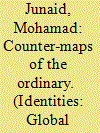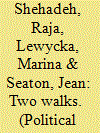| Srl | Item |
| 1 |
ID:
172136


|
|
|
|
|
| Summary/Abstract |
This article examines practices of resistance that thwart Indian state’s control over everyday life in Kashmir. The state frequently uses ‘curfew’ to dominate public space, shut down ordinary mobility, and suppress pro-independence politics. Curfews are enforced through punitive prohibitions and by activating the militarised infrastructure built to reinforce Indian rule over the region since 1947. Yet, Kashmiris are not passive objects of this control. Through overt and hidden practices of resistance and disobedience, like sangbāzi and, what I call, counter-mapping, they keep their aspirations for independence alive, while rebuilding a semblance of everydayness under the occupation. Desire to walk freely becomes the key metaphor for freedom from military control. Based on ethnographic and theoretical material, the article makes a case that in spaces under long-term military occupations political subjectivity is primarily expressed and enacted as a bodily demand to become visible in public space.
|
|
|
|
|
|
|
|
|
|
|
|
|
|
|
|
| 2 |
ID:
086966


|
|
|
|
|
| Publication |
2009.
|
| Summary/Abstract |
In the summer of 2008 novelist Marina Lewycka and author and human rights lawyer Raja Shehadeh went on two walks: the first in Palestine near Ramallah near the Beit Eil Jewish settlement, the second on Kinder Scout in the Peak District, the site of the mass trespass in 1932 to reclaim the right to walk on the hills. This account of the conversation they recorded on the second walk includes observations by Marina on writing about Palestine and Israel and reflections by Raja about the effect of the Israeli occupation on the fragile Palestinian landscape. It also includes their discussions on writing, walking and the meaning it has to each of them, as well as political comments on the Israeli-Palestinian conflict evoked by visiting these sites. They wonder whether a similar act of resistance would be possible in Palestine and what it would mean to the future of the conflict.
|
|
|
|
|
|
|
|
|
|
|
|
|
|
|
|